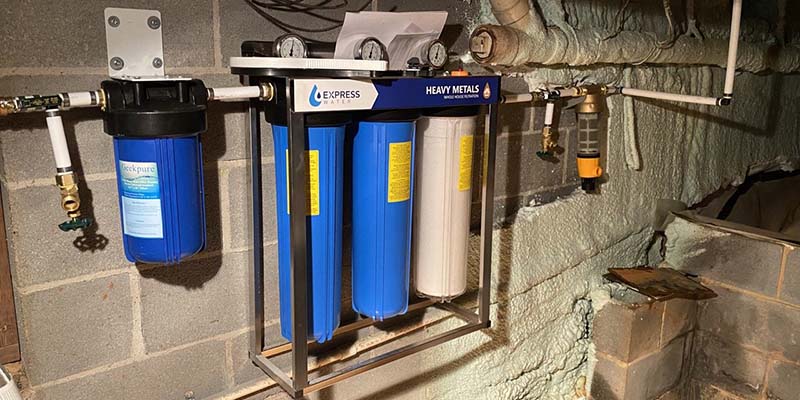Best Whole House Water Filter Systems: Keep Your Water Clean and Safe
A whole house water filter cleans all the water entering your home, so every tap—from kitchen to shower—gives you fresher, safer water. Want better water for drinking, cooking, and bathing? This system has your whole house covered!
A whole house water filter cleans all the water entering your home, so every tap—from kitchen to shower—gives you fresher, safer water. Want better water for drinking, cooking, and bathing? This system has your whole house covered!
How It Works: Filtering Water at the Point of Entry
The filtration process begins at the point of entry, where water from either a municipal supply or a private well first enters the residence. Upon entry, the water passes through a series of filter cartridges specifically designed to remove various contaminants, including sediments, chlorine, heavy metals, and microorganisms. This single system efficiently treats all water access points, providing homeowners peace of mind by safeguarding against impurities that could adversely affect their health as well as their water utility efficiency.

Types of Whole House Water Filter Systems
Activated Carbon Filters
Activated carbon filters utilize adsorption to function effectively. In this process, contaminants like chlorine and volatile organic compounds (VOCs) cling to the porous surface of activated carbon. These filters significantly enhance the water's taste and odor while substantially reducing harmful chemicals. However, they come with limitations; they require regular replacement to maintain effectiveness, as they can become saturated and lose their capability to filter out impurities, particularly heavy metals and dissolved minerals.
Reverse Osmosis Filters
Reverse osmosis (RO) filters employ a comprehensive multi-stage filtration process, consisting of sediment filters, activated carbon filters, and a semi-permeable membrane. This sophisticated method effectively removes a wide range of contaminants such as lead, fluoride, and nitrates. It is particularly beneficial for households in regions with high concentrations of specific pollutants. While highly effective, RO systems can be slower and may lead to water wastage, making them more suitable for households requiring thorough purification above all.
UV Filters
Ultraviolet (UV) filters use UV light to safely destroy microbial threats, including bacteria, viruses, and parasites, ensuring the delivery of safe drinking water. These systems are crucial in areas where well water is the primary source, as it can pose a significant microbial risk. While UV systems are adept at disinfection, they do not remove chemical contaminants, thus often pairing them with other filtration methods for a more comprehensive safeguard against water quality issues.
Water Softener Systems
Water softeners tackle challenges associated with hard water, characterized by elevated levels of minerals like calcium and magnesium. These systems operate through an ion exchange mechanism, substituting hard minerals with sodium or potassium ions, which helps prevent scale buildup in plumbing and appliances. Moreover, they benefit skin and hair by reducing dryness and irritation that hard water might commonly cause, making them ideal for locations plagued by high mineral content.
Iron and Manganese Filters
For households relying on well water, iron and manganese filters become essential. These minerals can lead to staining on plumbing fixtures and laundry. Such filtration systems work by oxidizing these elements, enabling their removal from the water supply. Eliminating iron and manganese is vital not only for maintaining aesthetic quality but also for preventing mineral buildup in plumbing systems, ultimately extending their operational lifespan.
Factors to Consider When Choosing a Whole House Water Filter
Selecting the appropriate whole-house water filter is crucial for ensuring safe and clean water throughout your home. Here are several key factors to ponder:
1. Water Quality and Contaminants
Begin by assessing your water quality through testing. Understanding specific contaminants like lead, chlorine, or bacteria is integral in determining the right filter system. This initial evaluation allows for a tailored selection that meets your unique needs.
2. Filter Capacity
It's important to select a filter based on your household size and water consumption. Larger homes may necessitate higher capacity systems to ensure sufficient flow rates and filtration during peak usage.
3. Maintenance Requirements
Evaluate the frequency with which filters need replacing and the maintenance involved in the system. Some units require minimal upkeep, while others might have more frequent replacement needs that could affect long-term usability.
4. Installation
Consider the option of DIY installation versus hiring a professional. It is essential to verify that the filter system is compatible with your plumbing setup, as this could considerably influence performance and lifespan.
5. Budget Considerations
Finally, gauge both initial costs and ongoing expenses, including maintenance and filter replacements. While budget-friendly options may seem attractive, they may lead to more costs over time if they necessitate frequent servicing or parts replacement.
Top Whole House Water Filter Systems on the Market
Choosing to invest in a whole-house water filter system is essential for families seeking access to clean, safe drinking water. Here are five top-rated systems categorized according to their distinct features, designed to meet varying water quality requirements:
Aquasana Rhino Whole House Water Filter System
- Features: 1,000,000-gallon capacity, efficiently removes 97% of chlorine, comes with a 10-year warranty.
- Pros: Long-lasting, easy to maintain.
- Cons: Higher initial investment, may require professional installation.
- Ideal for: Homes with elevated chlorine concentrations in their water supply.
SpringWell Whole House Water Filter System
- Features: Effectively removes chlorine, VOCs, heavy metals, and more harmful contaminants.
- Pros: High flow rates, ideal for large families.
- Cons: Requires more space for installation.
- Ideal for: Larger households needing advanced filtration.
iSpring WGB32B 3-Stage Whole House Water Filtration System
- Features: Multi-stage filtration effectively removes chlorine, sediments, and some heavy metals.
- Pros: Budget-friendly, straightforward installation.
- Cons: Not the best option for well water containing iron and heavy metal content.
- Ideal for: Homeowners looking for an economical filtration solution.
Pelican Water Systems 10-Stage Whole House Filtration System
- Features: Features ten stages of filtration and includes UV protection.
- Pros: Extensive filtration capabilities, low maintenance needs.
- Cons: Higher price point.
- Ideal for: Seekers of comprehensive filtration solutions with added UV protection.
Home Master HMF3SDGFEC Whole House 3-Stage Water Filter
- Features: Specializes in removing chlorine, heavy metals, and sediments.
- Pros: Easy to install, good water flow rate.
- Cons: May necessitate more frequent filter replacements.
- Ideal for: Homeowners desiring a balanced filtration approach.
Benefits of Using a Whole House Water Filter
Utilizing a whole-house water filter system provides numerous advantages for households aiming to enhance their water quality.
First and foremost, these systems deliver fresh, clean water from every tap, ensuring safe and palatable drinking, cooking, and bathing experiences. By minimizing harmful mineral buildups that can clog pipes over time, they also promote reduced wear and tear on plumbing systems.
Furthermore, improvements in water quality can yield significant health benefits, with users often reporting better skin and hair health due to the removal of irritating chlorine and other harmful contaminants.
Lastly, with less unpleasant taste and odor, these filtration systems elevate the overall experience of water consumption, making hydration a more enjoyable routine. Investing in such systems not only safeguards the purity of your water but also enriches the standard of daily life.

Common Problems with Whole House Water Filters
Despite being vital for sustaining clean and safe water throughout your home, whole-house water filters can encounter several common issues.
Clogging and Pressure Drop
A prevalent problem is clogging, which can lead to noticeable drops in water pressure. Users should routinely monitor water flow; any significant reduction in pressure may indicate clogs that need inspection or filter replacement.
Filter Lifespan and Cost
Filters exhibit varying lifespans and cost factors. For example, sediment filters typically last anywhere from 6 to 12 months, while activated carbon filters need replacing every 2 to 4 years, depending on use. Costs also fluctuate, generally ranging from $50 to over $200 based on material and brand quality.
Troubleshooting Tips
Frequent issues such as leaks or continuing low water pressure can typically be resolved by checking connections for tightness, confirming proper valving, and inspecting for any damage within the filter housing. Establishing a regular cleaning schedule can help prevent many of these recurring issues.
How to Maintain Your Whole House Water Filter System
To keep your whole house water filter operating at optimal efficiency, consistent maintenance should be a priority. This starts with routinely checking both the filters and the valve settings. Inspections should be conducted every 3 to 6 months to identify any sediment or deposits that may impede water flow. It’s also wise to check the valves for leaks or signs of deterioration.
Recognizing indicators warranting filter replacements is essential. If there’s a noticeable decrease in water pressure, alterations in taste or odor, or any signal from your system’s indicator light suggesting a need for replacement, it’s time to replace the filters.
Adhering to these maintenance guidelines not only ensures the provision of clean water but also enhances the lifespan of your filtration system.



